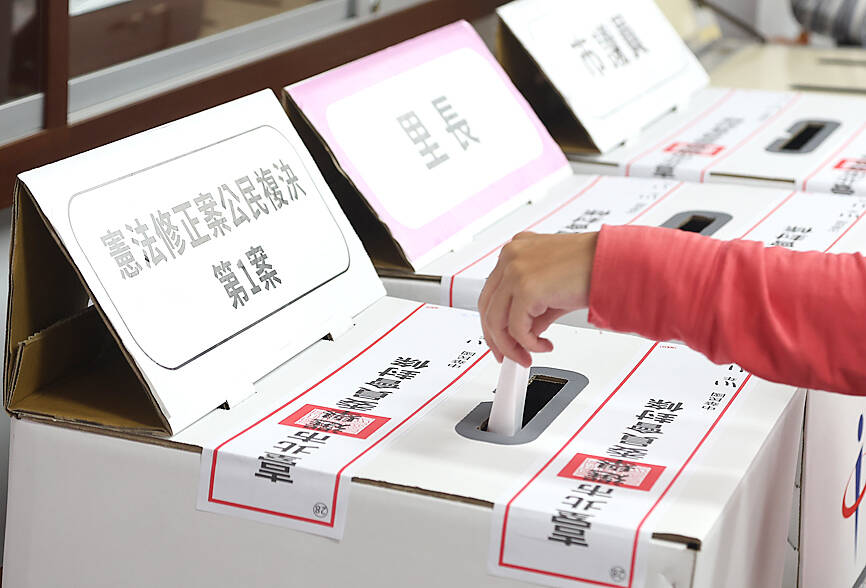A proposed constitutional amendment to lower the voting age to 18 from 20 did not pass yesterday after it failed to garner the minimum number of votes required.
The referendum, which asked voters if they agree to amend the Additional Articles of the Constitution to grant Taiwanese aged 18 years or older the right to vote and the right to run for public office, was held concurrently with local government elections.
The referendum needed 9,619,697 “yes” votes, or half the number of eligible voters, to pass.

Photo: CNA
The Central Election Commission data showed that 5,647,102 voted “yes,” while 5,016,427voted against the proposal.
To amend the Constitution, a draft amendment must first pass the legislature with three-quarters of legislators present and three-quarters of those present voting for it. The amendment must then be endorsed in a national referendum.
The 113-seat legislature on March 25 voted 109-0 in favor of lowering the voting age, sending a message of cross-party support for the measure and sending it to a national referendum.
A plebiscite on a proposed constitutional amendment is different from referendums seeking to change a government policy or law.
The election commission has said that referendums on constitutional amendments are not subject to the Referendum Act (公民投票法), which allows citizens aged 18 or older to vote and prohibits holding referendums on the same day as national elections.
The commission also cited the Constitution as saying that only citizens aged 20 or older are eligible to vote in referendums on constitutional amendments.
In addition, referendums on constitutional amendments requires twice the number of “yes” votes to pass, while other referendums only require 25 percent of eligible votes to cast a ballot and a majority to support the proposed policy or law.
This story has been updated since it was first published.

ACTION PLAN: Taiwan would expand procurement from the US and encourage more companies to invest in the US to deepen bilateral cooperation, Lai said The government would not impose reciprocal tariffs in retaliation against US levies, President William Lai (賴清德) said yesterday, as he announced five strategies to address the issue, including pledging to increase Taiwanese companies’ investments in the US. Lai has in the past few days met with administrative and national security officials, as well as representatives from various industries, to explore countermeasures after US President Donald Trump on Wednesday last week announced a 32 percent duty on Taiwanese imports. In a video released yesterday evening, Lai said that Taiwan would not retaliate against the US with higher tariffs and Taiwanese companies’ commitments to

‘SPECIAL CHANNEL’: Taipei’s most important tasks are to stabilize industries affected by Trump’s trade tariffs and keep negotiations with Washington open, a source said National Security Council Secretary-General Joseph Wu (吳釗燮) arrived in the US for talks with US President Donald Trump’s administration, a source familiar with the matter said on Friday. Wu was leading a delegation for a meeting known as the “special channel,” the Financial Times reported earlier. It marked Trump’s first use of the channel since returning to the White House on Jan. 20. Citing a source familiar with the matter, the Financial Times reported that Minister of Foreign Affairs Lin Chia-lung (林佳龍) was also a part of the delegation. The visit came days after China concluded war games around Taiwan and amid Trump’s

Intelligence agents have recorded 510,000 instances of “controversial information” being spread online by the Chinese Communist Party (CCP) so far this year, the National Security Bureau (NSB) said in a report yesterday, as it warned of artificial intelligence (AI) being employed to generate destabilizing misinformation. The bureau submitted a written report to the Legislative Yuan in preparation for National Security Bureau Director-General Tsai Ming-yen’s (蔡明彥) appearance before the Foreign Affairs and National Defense Committee today. The CCP has been using cognitive warfare to divide Taiwanese society by commenting on controversial issues such as Taiwan Semiconductor Manufacturing Co’s (TSMC, 台積電) investments in the

HELPING HAND: The steering committee of the National Stabilization Fund is expected to hold a meeting to discuss how and when to utilize the fund to help buffer the sell-off The TAIEX plunged 2,065.87 points, or 9.7 percent, to close at 19,232.35 yesterday, the highest single-day percentage loss on record, as investors braced for US President Donald Trump’s tariffs after an extended holiday weekend. Amid the pessimistic atmosphere, 945 listed companies led by large-cap stocks — including Taiwan Semiconductor Manufacturing Co (TSMC, 台積電), Hon Hai Precision Industry Co (鴻海精密) and Largan Precision Co (大立光) — fell by the daily maximum of 10 percent at the close, Taiwan Stock Exchange data showed. The number of listed companies ending limit-down set a new record, the exchange said. The TAIEX plunged by daily maxiumu in just